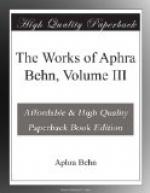For ‘shamming’ cf. Wycherley’s The Plain Dealer (1674), iii, I, where the Lawyer says to Manly: ‘You ... shammed me all night long.’ ‘Shammed!’ cries Manley, ‘prithee what barbarous law-term is that?’ ‘Shamming ...’ answers the lawyer, ‘’tis all our way of wit, Sir.’ And Freeman explains ’Shamming is telling you an insipid dull lie with a dull face, which the sly wag the author only laughs at himself; and making himself believe ’tis a good jest, puts the sham only upon himself.’
p. 176 Dumfounding. A rude and rough form of practical joking. The players ‘dumfounded’ each other with sudden blows stealthily dealt. cf. Shadwell’s The True Widow (1678), Act iv, I. Prig in the theatre says: ’You shall see what tricks I’ll play; ‘faith I love to be merry’. (Raps people on their backs, and twirls their hats, and then looks demurely, as if he did not do it.) The pit, often a very pandemonium, was the chief scene of this sport. Dryden, prologue to The Prophetess (1690), speaks of the gallants in the theatre indulging freely in
That witty recreation, called dumfounding.
p. 176 stum’d Wine. To stum wine is to renew dead and insipid wine by mixing new wine with it and so raising a fresh fermentation. cf. Slang (still in common use) ‘stumer’, a generic term for anything worthless, especially a worthless cheque.
p. 176 Grisons. A ‘grison’ is a servant employed on some private business and so dressed in gray (gris) or a dark colour not to attract notice. cf. Shadwell’s The Volunteers (1693), Act ii, sc. I: ’Sir Nich. I keep grisons, fellows out of livery, privately for nothing but to carry answers.’
THE LUCKY CHANCE.
p. 183 Laurence, Lord Hyde. This celebrated statesman (1641-1711) was second son of Edward Hyde, first Earl of Clarendon. The Dedication must have been written in 1686 when, wavering between the Catholic Faith and Protestantism, he was still high in favour with the King. 4 January, 1687, he was dismissed from court owing to his persistent refusals to be received into the Church.
p. 183 The Abbot of Aubignac. Francois Hedelin, Abbe D’Aubignac, a famous critic and champion of the theatre, was born at Paris, 4 August, 1604. Amongst his best known works are: Terence justifie (4to, 1646, Paris), an attack on Menage; La Practique du theatre (4to, 1669, Paris); and Dissertations concernant le poeme dramatique en forme de remarques sur les deux tragedies de M. Corneille, intitulees Sophonisbe et Sertorious (12mo, 1663, Paris). He died at Nemours, 27 July, 1676.
p. 185 Dr. Davenant. Charles Davenant, LL.D, (1656-1714), eldest son of Sir William Davenant. He sat for St. Ives, Cornwall, in the first parliament of James II, and was appointed, along with the Master of the Revels, to license plays.




